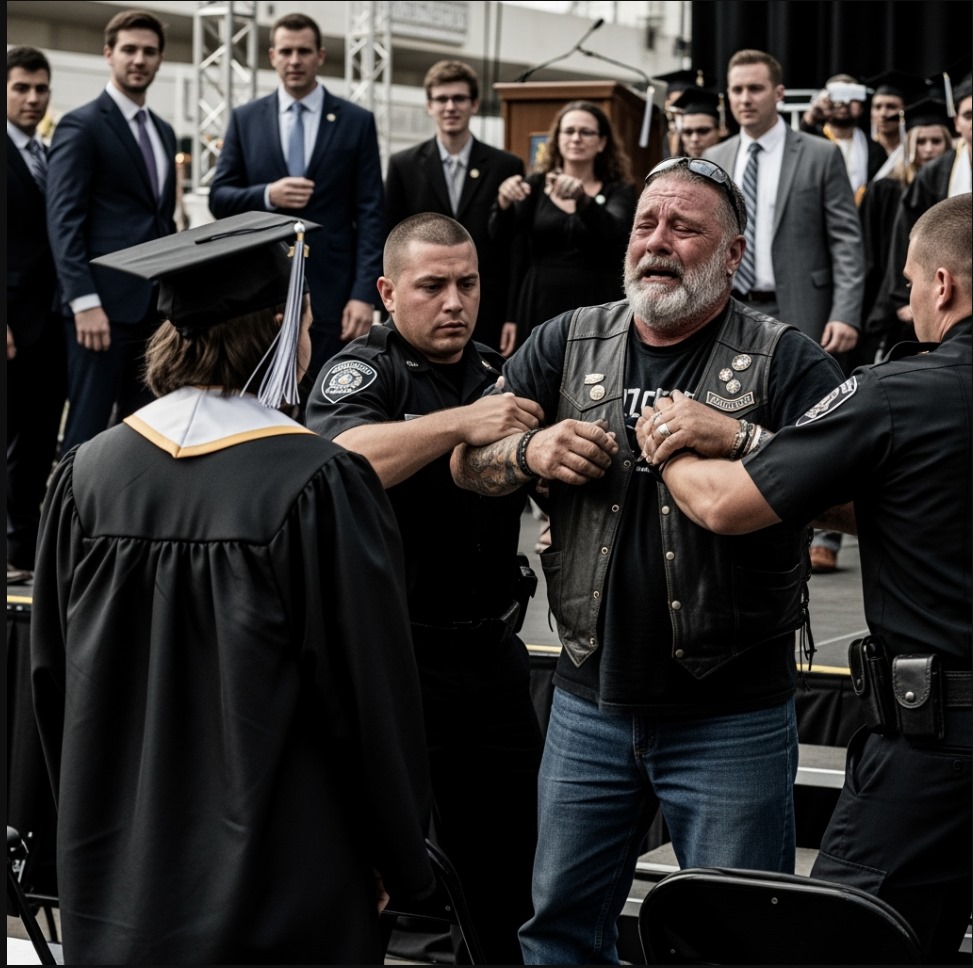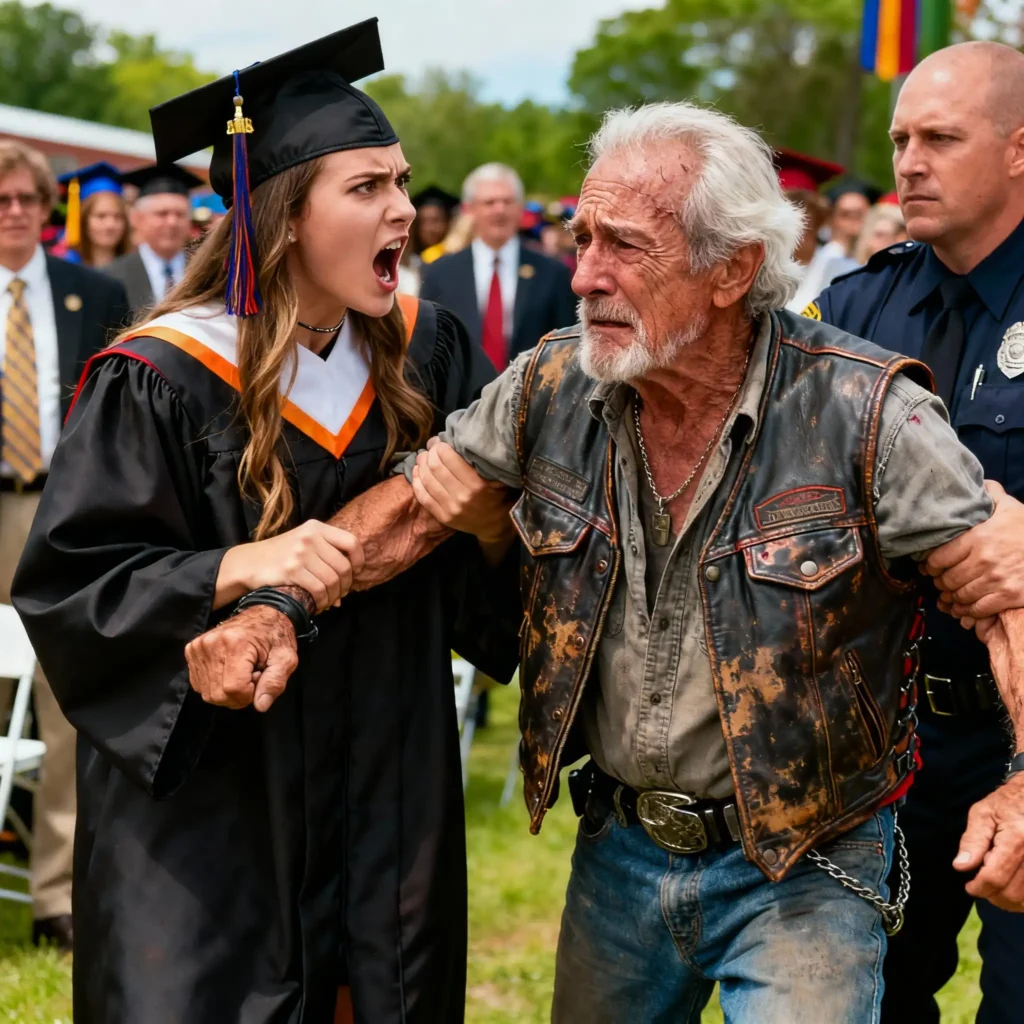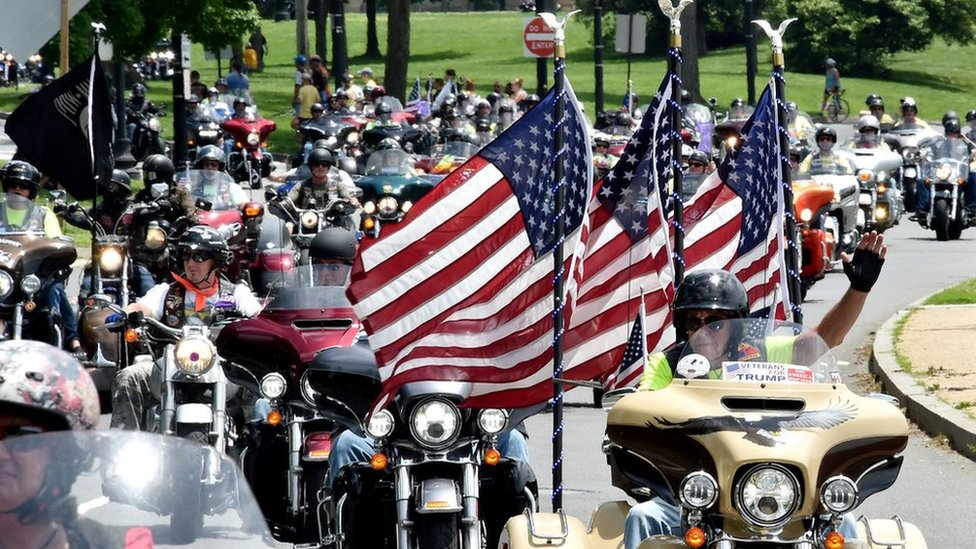My Biker Father Showed Up to My Harvard Graduation — And Changed Everything I Thought I Knew About Love
Some moments in life divide everything into “before” and “after.” For me, that moment came on the day I graduated from Harvard — the day I called security to remove my father from the ceremony. He stood there in his worn leather vest, surrounded by suits and gowns, clutching a small wrapped box. My classmates whispered. My professors stared. My fiancé’s parents looked horrified. And all I could think was: He doesn’t belong here.

I thought I was done with him — done with the man who smelled like oil and gasoline, who’d missed my mother’s last breath because of some biker rally. I told everyone he was dead. It was easier than admitting that my father, the man I once loved more than anyone, rode with a motorcycle club somewhere in Kansas. But that box he left for me? It rewrote everything I thought I knew.
The Day I Chose Shame Over Blood
My name is Katherine Chen-Morrison. Harvard graduate. Goldman Sachs recruit. The daughter of a man I buried in conversation years before he actually died.
At fourteen, I decided I was better than him — better than the grease, the tattoos, the broken-down trailer where I grew up. When Mom passed, I blamed him for every ache in my body. He hadn’t made it back in time. He’d been racing, he said. I never forgave him.
So when he showed up at my graduation — looking exactly like the man I’d spent years pretending didn’t exist — I did the only thing I knew how to do. I asked security to take him away. He didn’t fight. He just looked at me with those gray eyes that matched mine and whispered, “Five minutes, Katie-bug. Please.”
I turned my back.
Video : Bikers Are Awesome – Random Acts of Kindness [Ep.#62]
The Gift I Should Have Thrown Away
Three hours later, I found his gift on my doorstep. Brown paper. No card. But the handwriting was familiar — rough, slanted, and heartbreakingly careful. I almost threw it in the trash. I wish I could say I did.
Inside was a wooden box. Hand-carved, polished, and delicate — the kind of craftsmanship that made me remember the father who once built dollhouses and carved birds for me when I was little. Inside it were three things: a bank statement, a stack of receipts, and a letter that started with two words that shattered me: “Katie-bug.”
The Truth I Never Wanted to Hear
In his letter, he told me everything. How after Mom’s diagnosis, he sold everything except his bike because that was his only way to make money. How every rally I’d hated him for attending was him fighting for her life. How the weekend she died, he’d been in a race — not for glory, but for a $15,000 prize meant to fund her last treatment.
She had told his friend not to call him. “Let him race,” she’d said. “Let him win.” By the time he got home, she was gone.
Every mile he rode after that, every scar on his hands, every patch on his vest — it was all for me. He’d spent a decade living out of his truck, fixing bikes, racing, sleeping under overpasses — every dollar earned deposited into that account to pay for my tuition, my apartment, my future.
The man I told the world was dead had kept me alive.

The Ride Back Home
A week later, I drove to Kansas. I found him in the same shop he’d always owned — Morrison Custom Cycles. He was under a Harley, grease up to his elbows. When he rolled out and saw me, he smiled like no time had passed. “Katie-bug?”
We talked for hours — about Mom, about the years we’d both lost. The truth was uglier and more beautiful than anything I’d imagined. He hadn’t chosen motorcycles over me. He’d chosen survival. And he’d done it in the only language he knew — work, sacrifice, and quiet devotion.
He showed me his wall of photos — all of me. Every school picture, every article, even my Harvard acceptance letter framed in the center. He’d never missed a thing. He’d just learned to love me from the shadows.
When the rest of his club arrived — twenty men with rough hands and gentle hearts — they already knew my name. “College girl,” they called me. “Harvard girl.” They’d all contributed money over the years. My father hadn’t just raised me — his brothers had too.
Riding Into Redemption
That day, my father handed me something: my mother’s old helmet. Pink, with faded butterflies painted on the side. “She always said you’d come back for it,” he told me.
I rode with him that afternoon. Wind in my face, arms around him, tears hidden by the helmet. We stopped at my mother’s grave — the stone polished, fresh flowers laid out. He’d been visiting every week for eight years.
Video : Top 9 Bikers Helping People Videos!
“I brought her,” he whispered. “Our Katie-bug. Harvard graduate.”
And for the first time since I was fourteen, I felt like his daughter again.
Redefining Success and Love
In the months that followed, I broke off my engagement. My fiancé had called my father “trash” after graduation. That word cut deeper than he could have known. I realized then that I’d spent years chasing approval from people who would never see the kind of love I came from.
With my father’s help, I started The Katherine Morrison Foundation — scholarships for kids whose parents worked blue-collar jobs, for kids who thought Ivy League dreams weren’t meant for them. The first fundraiser was a motorcycle rally. A thousand riders showed up. We raised enough to send three students to college.
Every year since, that ride has grown. Every year, my father rides at the front, leather vest and all.
The Last Ride
Now, he’s sick. Lung cancer — the cruel price of decades spent in garages and on highways. But he’s still smiling. Still riding. “Every mile bought you a book,” he jokes. “Fair trade.”
When Harvard invited me back to give the commencement speech, I said yes — but only if he could be there. “It’s called Authentic Success,” I told him. “And it’s about you.”

He laughed, then cried. “Your mom would love that.”
“She knows,” I said, listening to the wind chimes he’d hung in the shop. The ones that ring whenever someone mentions her name. They were ringing that night.
The Man the World Never Saw
My father never walked through Harvard Yard in a suit. He never shook hands with deans or donors. But he built something far greater than prestige — he built possibility. For me. For kids like me. For anyone who’s ever been told they don’t belong.
He was a biker. A mechanic. A man the world called “nobody important.” But to me, he became everything.
And the truth I finally learned? Real success isn’t about leaving where you came from — it’s about rising high enough to see that the ground you came from was sacred all along.